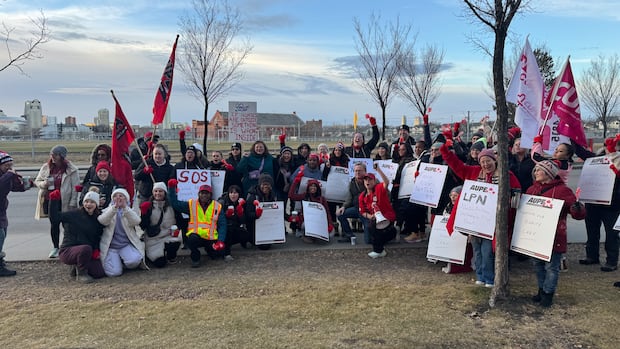A union representing some Alberta hospital workers called its members back from the picket lines, after it reached a tentative deal with Alberta Health Services (AHS).
The Alberta Union of Provincial Employees (AUPE), which gave strike notice Wednesday after bargaining fell apart over wages, announced via social media early Saturday morning that a deal still hadn't been reached.
Members promptly started labour action after the 8:30 a.m. Saturday deadline passed. But just after 9 a.m., the union called down the strike because it reached a tentative agreement with AHS for 16,000 nursing-care workers, including licensed practical nurses and health-care aides.
“Last night, we [negotiated] to about 1 a.m. and we didn’t get a call until … not very early this morning, which is why we only had one minute left before the deadline,” AUPE president Sandra Azocar said during a news conference Saturday morning.
According to a statement on AUPE's website, the reversal came after the parties brokered a tentative agreement “mere minutes before our strike was scheduled to begin.”
The tentative agreement — which union members must still choose to ratify — includes a 12 per cent wage increase over four years for all employees in the bargaining unit, said Kate Robinson, the union's lead negotiator, during Saturday's news conference.
The deal also includes salary market adjustments of four per cent for health-care aides and 10 per cent for LPNs, retroactive to April 1, 2024, Robinson said.
"Our members’ wages will go up significantly from that date," she said.
The retroactive payments prompted AUPE to agree to the contract, as AHS hadn't offered that before, Robinson said.
During her bi-weekly radio show Saturday morning, Alberta Premier Danielle Smith said she is hopeful that this 11th-hour tentative agreement with AUPE leadership will end the labour action.
“There were a lot of people up very late last night trying to bridge that final gap. We really weren’t that far apart and it was just frustrating. Everyone was [saying], ‘Oh, what do we do to get to the finish line?'” Smith said.
Comparable pay for LPNsAfter Saturday's deadline passed, a crowd of about two dozen people, demonstrating on the sidewalk along Kingsway in front of Edmonton's Royal Alexandra Hospital, quickly grew to about 100. Passing motorists honked in support while workers waved picket signs.
Kayla Oliveira, an LPN with 12 years of experience in internal medicine, was among them. She told CBC News that nurses like her get paid far less than registered nurses, although they do similar work.
Both nursing jobs require post-secondary education, but LPNs have diplomas whereas registered nurses have university degrees. LPNs often collaborate with registered nurses and doctors, while RNs can work more autonomously.
Oliveira acknowledged different educational requirements, but said LPNs do 85 per cent of the work of an RN, but get 60 per cent of the pay.
 Dozens of health-care workers picket outside Royal Alexandra Hospital in Edmonton Saturday morning. (Natasha Riebe/CBC)
Dozens of health-care workers picket outside Royal Alexandra Hospital in Edmonton Saturday morning. (Natasha Riebe/CBC)“Most of our colleagues on the floor could probably attest to the fact that you wouldn't be able to tell the difference between us, our designations, at least working on the floor,” she said.
“Ultimately, it comes down to just being a workhorse for the company and not getting the respect and recognition that we deserve.”
Chloe Sedlacek, an LPN who is training to be a perioperative nurse (a registered nurse who cares for surgical patients), echoed Oliveira's concerns about pay. She also noted they have had a greater workload over the years.
“I have definitely noticed some staffing constraints,” she told CBC News. “Definitely higher patient ratios within the units.”
In a statement, Finance Minister Nate Horner said he is encouraged that a tentative deal has been reached, and he looks forward to AUPE members having the opportunity to vote on it.
The government respects the work LPNs and health-care aides, "and they deserve a fair agreement," said Horner, whose ministry leads public-sector collective bargaining.
The settlement reflects strong wage offers for those health-care professionals, ensuring Alberta's salaries stay competitive with other Canadian jurisdictions, he said.
Ratification voteAUPE will hold a town hall Tuesday, after which members will vote on whether to ratify the deal and implement a collective agreement, said Azocar, the union president.
“Ultimately, the members always have the choice of supporting it or not supporting it. What they need to do is to look at what is there and how we can grow from what we were able to achieve in this contract,” Azocar said.
“It set the standards for a lot of the health-care bargaining that we have upcoming as a union.”
She added that she would next like to see the provincial government develop a human-resources strategy that addresses staffing shortage issues throughout Alberta's health-care system.











